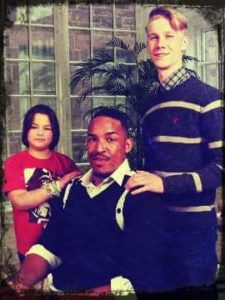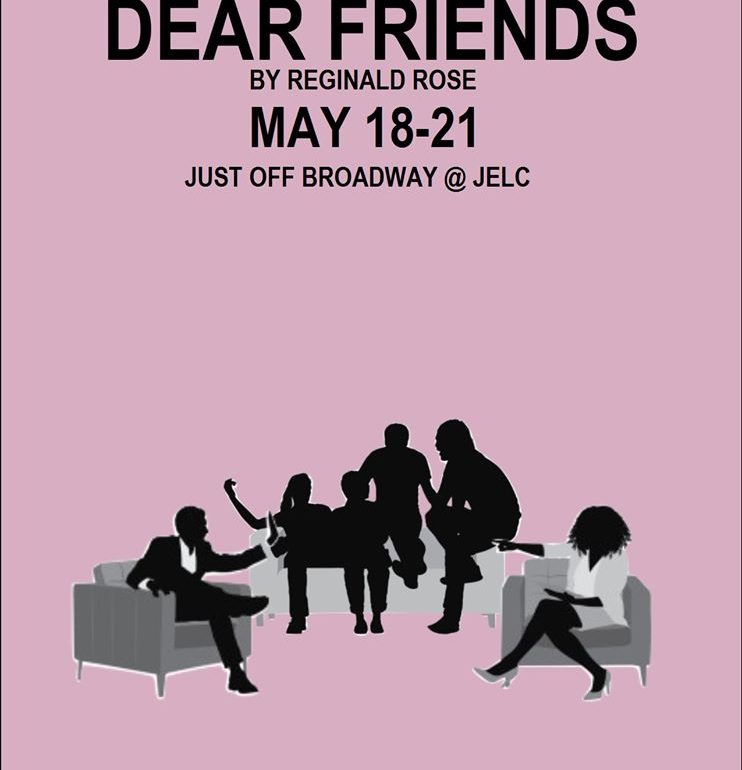What if it hasn’t been your day, your week, your month, or even your year? You’ve got friends who will be there for you! Right? What of those friends are just meddlesome, busybody, buttinski folk who can’t leave well enough alone and have to knit-pick at your problems to make them feel better about their own? In the east coast premiere of Reginald Rose’s Dear Friends, that recipe for disaster is exactly what’s brewing up in the Lambert’s Living Room. Appearing for one weekend only at Just Off Broadway in their straight-shows home of Jerusalem Evangelical Lutheran Church, this area premiere, directed by Patrick Jay Golden, calls into question the normalcy of marriages and how they function when surrounded by other marriages.

Reginald Rose’s play is not without flaw to begin with, showcasing four dysfunctional married couples with varying degrees of disaster developing behind the closed doors of their flawless facades that they put up whenever they’re among the other married couples. But the dysfunction that Rose writes into the script feels dulled and somewhat dimmed by modern day standards; this is understandable as the play was written in the 1960’s, however Director Patrick Jay Golden has shifted the show into present day, which sets the players at a disadvantage as already the simplistic problems feel lackluster. Add to this that the play was written for four heterosexually married couples but Golden is presenting it with one male gay couple, one female lesbian couple, and two heterosexual couples and things get dicey. Golden could be making a strong statement with this casting for the modern day but because of the dynamic at which the couples have dysfunctions, doing this creates tremendous plot hole issues which actually weaken the statement that Golden might have made. Even if Golden had been able to somehow circumnavigate one of the couple’s issues being completely invalidated by his gender-fluid casting, not switching up the pronouns correctly to acknowledge the gender fluid casting became a distraction and ultimately detracted further from the action and performances.
The show reviewed was an invited press preview, but the pacing was not quite up to par. Golden needs to drive faster speed during the shouting scenes, lines tumbling one over top the next to motivate these arguments to their fullest potential and to provide the climactic reward the audience desperately deserves. And though the set, designed by Theresa Bonvegna, was lovely— including the nuances to detail in making the apartment a stereotypical musical-theatre loving apartment owned by a gay male couple— creating two sets, one on the stage and a lower extension beneath, was cumbersome and gummed up the pacing as well. Reginald Rose has written dialogue to express scene changes— like when The Graves are in Atlantic City and they say it several times over in the first few sentences (and this is then augmented by Jason Crawford’s Sound Design)— which negate the need for alternate locations. Additionally, the scenes jump around not only in spatial location but in time. Without reading the program, there is no indicator on the stage (via lights or costume change, makeup, etc.) nor in the dialogue to indicate that the characters are moving back and forth in time. A simple shift in lighting, especially if done in a one room set, could have easily fixed this issue.
Golden’s other major directorial issue is the way he’s laid out Bonvegna’s set. Again, a delightfully detailed and gorgeous display of furnishings, however, it’s set like an actual living room as opposed to a living room on a stage. This in itself is not problematic, however, the way Golden blocks the cast on the stage results in a lot of two-sided shouting, hollering across the space at one another. And even this could be overlooked if the shouting was happening at a breakneck pace so that there weren’t falling gaps between lines. Golden does, however, succeed in several other places throughout the production. Casting choices are sharp and smart, pairing each couple together to maximize the character potential and compliment the unique chemistries of each couple is a thing that Golden does extremely well.
The performances across the board are mostly solid and study, with a few hiccupped lines and the aforementioned pacing issues. But the show is not without talent, not without emotional connection, and certainly not without heart and soul when it comes to the real problems etching their way to the surface. Joyanne Gohl deserves a nod of praise as Flo Lambert for the two lines she is given late in the second act. Although Gohl’s character is mostly superfluous (and could easily be handled by an off-stage shout of her two lines— but why would you when you have such an adorable young actress willing to play the part?) she makes the most of those moments and easily wins the audience’s heart, as talented young performers are wont to do from time to time.

Gigi (Sarah O’Hara) and Vivian (India Palmer) Spears are the lesbian couple who have a dirty secret they’re hiding. Herein is where the director does an exceptional job of manipulating the dialogue exchange between the pair to reflect the gender-swap in this pairing. O’Hara and Palmer have a natural chemistry that burbles quite nicely, seeming to be the most repaired of the four couples at first glance. O’Hara is the more outspoken of the pair, but she holds her own defending Palmer’s character. Their scene— Act II, Scene II in their garden terrace from four years prior to where half of the play takes place— is a roller coaster of love and distress, insecurities and compliments, showering back and forth from one another. The pair handles their coupled scene extremely well together.

Lenny (Tom Piccin) and Charlotte (Penny Nichols) Marshall are a zesty couple, both filled to the brim with anger issues that are more prominently displayed during their scene, Act I, Scene IV. Piccin and Nichols have a volatile chemistry, which serves their dysfunctional marriage well. The gravity of that scene they share, and the consequent spillover from that scene into later, present-day moments, is striking and they both handle it extremely well. Nichols is as bombastic as Piccin, though both in their own way, with Nichols turning her outbursts into drunken rants while Piccin loses his temper like a volcano during the heated exchanges in the Lambert’s living room.

Michael (Jason Crawford) and Lois (Tracy Dye) Graves are the catalyst for the evening. Their marriage has openly failed, they’re getting a divorce, and their dear friends decide that such a move is simply unacceptable so they stage an intervention. By the time the play is finished, the problems that the Graves share are the most benign and innocuous of all four couples! Crawford is seriously sassy, with a loud bone to pick about his meddlesome friends while Dye takes the more panicked approach to being set upon by her mean-well married cohorts. The pair have a deep connected chemistry that really brings home the scene in Atlantic City that they share. The zingers that fly from Crawford’s lips in present day moments are sharp and the emotional connection that Dye brings to the character is strong.

Sal (Emmanuel Vickers) and Douglas (Brad Angst) Lambert aren’t really responsible for this coup against the Graves, excepting that they’re the hosts! Both Vickers and Angst are deeply invested in their characters. Vickers has astonishingly enthralling emotional responses that play out vividly on his animated facial features, especially during the confrontation of his solo scene shared with Angst. Though Angst floats as a character on the periphery in the initial present-day scenes, in his personalized couple scene with Vickers he is alarmingly present and really draws forth the inner inertia of the character in a way that is captivating. The pair are arguably the most driven in the debacle of “married couples gone wrong” and keeps the audience on their toes, especially once their problems are revealed.
The show is not without potential and not without good performances, but needs adjusting in several places. The play itself is not uninteresting, albeit slow to start, and has a lot that can be said for our private lives, the secrets we keep, and the roles we play in others lives.
Running Time: Approximately 2 hours with one intermission
Dear Friends plays through May 21, 2017 at Just Off Broadway Baltimore at the Jerusalem Evangelical Lutheran Church— 4605 Belair Road in Baltimore, MD. Tickets can be purchased at the door or in advance online. At this time, Just Off Broadway accepts cash only at the door.

